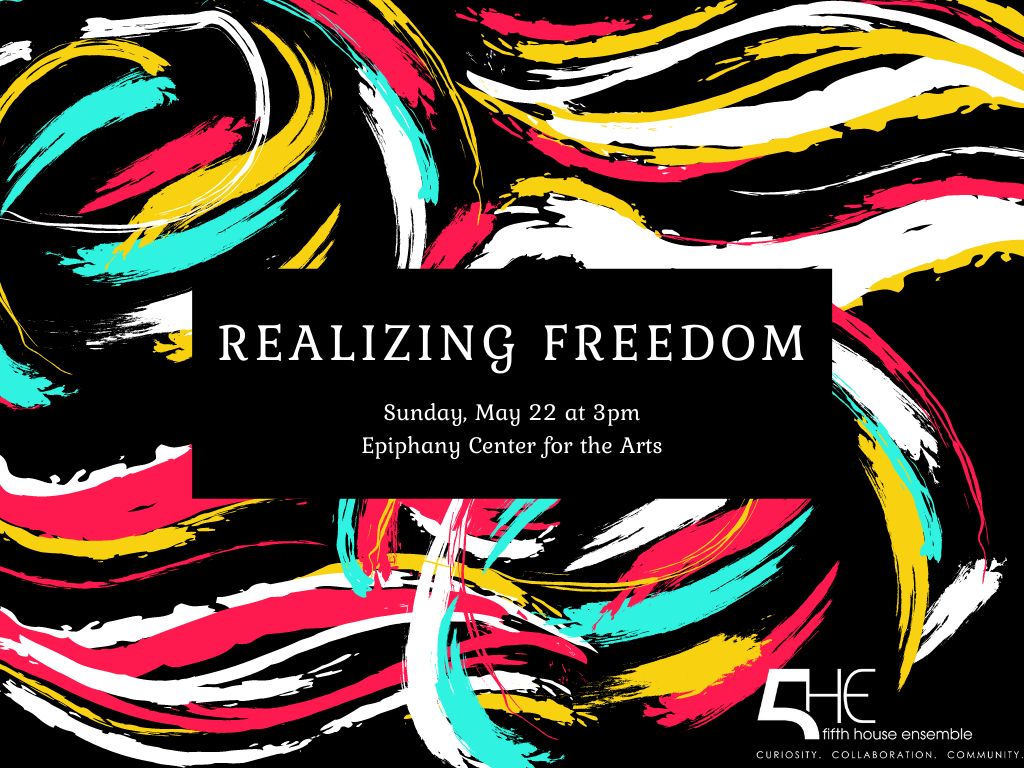program
What Kind of Times are These, Missy Alvarez (flute, oboe, clarinet, horn, bassoon)
the old revolutionary road breaks off into shadows
this is not somewhere else but here
it’s necessary to talk about trees
Thread and Pull, Brittany J. Green (bassoon, piano, violin, viola, cello)
BABA BIDEN SAVES AMERIKA, Nebal Maysaud (flute, clarinet, violin, cello, piano)
Scribble Scratch, Lauren McCall (violin, viola, cello)
Limit – Release, Kyle Rivera (clarinet, violin, viola, cello, piano)
When Walking Alone, Sofía Rocha (flute, violin, viola, cello, double bass, fixed media)
Today’s concert is in part a fundraiser for local organization Storycatchers Theatre. To learn more and make a donation, please click the link below.
musicians
Yukie Ota, flute
Grace Hong, oboe
Elizandro Garcia-Montoya, clarinet
Galina Kiep, bassoon
Parker Nelson, horn
Khelsey Zarraga, violin
Mason Spencer, viola
Herine Koschak, cello
Byeol Kim, piano
program notes
Missy Alvarez; What Kind of Times are These
This work for wind quintet was commissioned by the Fifth House Ensemble in response to the proposed theme ‘perceived freedom’. What Kind of Times are These was inspired by a poem of the same title from the prolific poet and feminist Adrienne Rich. Meaningful snippets from the poem are used to delineate movements and guide the overall form of the piece.
The first movement, titled “the old revolutionary road breaks off into shadows”, is an introduction as it also appears in the first stanza of the poem. It aims to poke fun at the heavily coveted yet hypocritical idea that all people are free in America. Rich uses this metaphor to reference to the road where revolutionary people were once eager to change the world. Then, the “shadows” where this road breaks off implies that in the future these people and urge for change has been forgotten. The melodic contour and rhythm are borrowed from the end of the United States national anthem, “O’er the land of the free” is interwoven and built upon throughout the entire movement and is never resolved. This blatant lack of resolution signifies an unanswered question: Are we truly free if we as citizens have little power in enacting any revolutionary change in this nation?
The second movement, titled “not somewhere else but here”, explores the idea of mysteriously searching for something but then realizing that it is right in front of you. In the second stanza of the poem, Rich emphasizes that the place mentioned in the poem is not somewhere else. It is there in her country and thereafter, the speaker says the country is moving closer to its truth and dread. She also implies that men in power have a way of making those voices who speak up against them disappear. This movement uneasily meanders its way through many different ideas but all in the same soundscape.
The last movement, titled “it’s necessary to talk about trees” is in a way, uplifting and hopefully while still acknowledging the progress that still needs to be made. This point in the poem is meant to urge readers to talk about what is happening in the world and have these tough conversations about freedom. For progress, it is necessary to speak out about ignorance and injustices. To express these ideas, this movement has repetitive, minimalistic figures with some conversational elements from interjecting voices.
What Kind of Times are These is meant to be a thought-provoking piece questioning what true freedom is, how can we ALL get it and in what mysterious ways it works for some and not others.
–Missy Alvarez
Brittany J. Green (b. 1991); Thread and Pull
Thread and Pull explores concepts of restraint, constraint, dissension, and freedom. Recurring melodic and aleatoric figures move throughout the ensemble, halted by driving rhythmic motives before breaking free at the end of the piece. Thread and Pull is a reflection on the complications and contradictions marginalized people must navigate this an imperalist white supremacist captialist patriarchal society. The piece utilizes text from Ghazal 1419 by Jalāl al-Dīn Muhammad Rūmī (public domain). Thread and Pull was commissioned in 2022 by Fifth House Ensemble and the Fresh Inc. Festival.
–Brittany J. Green
Nebal Maysaud; BABA BIDEN SAVES AMERIKA
"He did it!"
–Nebal Maysaud
Lauren McCall (b. 1986); Scribble Scratch
Scribble Scratch is a composition that explores the relationship between freedom and control. This is shown through a musical analogy of a DJ scratching a record and what a record sounds like when it can freely play the song etched on it. Scribble Scratch explores the continuum of these sounds.
–Lauren McCall
Kyle Rivera (b. 1996); Limit - Release
Freedom is often interpreted as an escape from some form of restraint or confinement. When one attains freedom, they gain a new set of liberties with which they can use to act in the world, express themself, and live autonomously. However, freedom from one form of restraint does not immediately result in exemption from all forms of control. Historically, when various oppressed groups of people fought for and attained freedom, they often found themselves facing new forms of oppression. In this way, "true" freedom seems to be a perpetually illusive concept rather than a tangible state. Every time we are released from our repressive bonds, we find new limits that were unseen in our previous state of restriction.
It is this perpetual cycle of limitation and release that is the focus of this work. Several simultaneous limitations restrict the sounds each instrument is capable of producing. As the music progresses, the instruments break through the restraints placed upon them and gain more liberties to colour the sound world they exist in. At various points in the music, the sounds will seem to "regress" to a former state of freedom. However, when these more "restricted" sounds return, they are mixed with "free" sounds and integrated into the less restricted sound world. This forms the basis of the continuous dialogue between freedom and oppression that drives the cycle.
–Kyle Rivera
Sofía Rocha (b. 1996); When Walking Alone
When Walking Alone is a piece that most directly is about street harassment, presenting a semi-narrative piece meant to evoke the experience of being harassed on the street, and followed by a direct narrative story as recorded by myself. Moreover, it is a piece about how freedoms which we may be legally granted, such as the right to free movement, may be limited or denied due to realities of our culture, wherein people who are not members of oppressed groups have greater freedom of movement than those who are. The example for this piece is sexist street harassment, and the danger that entails, which can make it difficult to go where one wishes when the wish, as well as possibly causing trauma in addition to the ever present risk that the threat advances beyond just being vocally harassed. There are many different situations and reasons why someone’s freedom of movement might be limited such as racism (with a well-known example being sundown towns and internment camps, as well as general racially fueled violence), homophobia (especially when with a partner in public), transphobia and many others.
–Sofía Rocha
funding credit
Fifth House Ensemble is supported in part by the John D. and Catherine T. MacArthur Foundation, the Alphawood Foundation, the MacArthur Fund for Arts and Culture at Prince, the National Endowment for the Arts, the Steven R. Gerber Trust, the Gaylord and Dorothy Donnelley Foundation, the Paul R. Judy Center, a Vision Grant from Illinois Humanities, a CityArts Grant from the City of Chicago Department of Cultural Affairs & Special Events, the Albert R. Pick Fund, New Music USA's New Music Organizational Development Fund, the Alice M. Ditson Fund, and by a grant from the Illinois Arts Council Agency.

